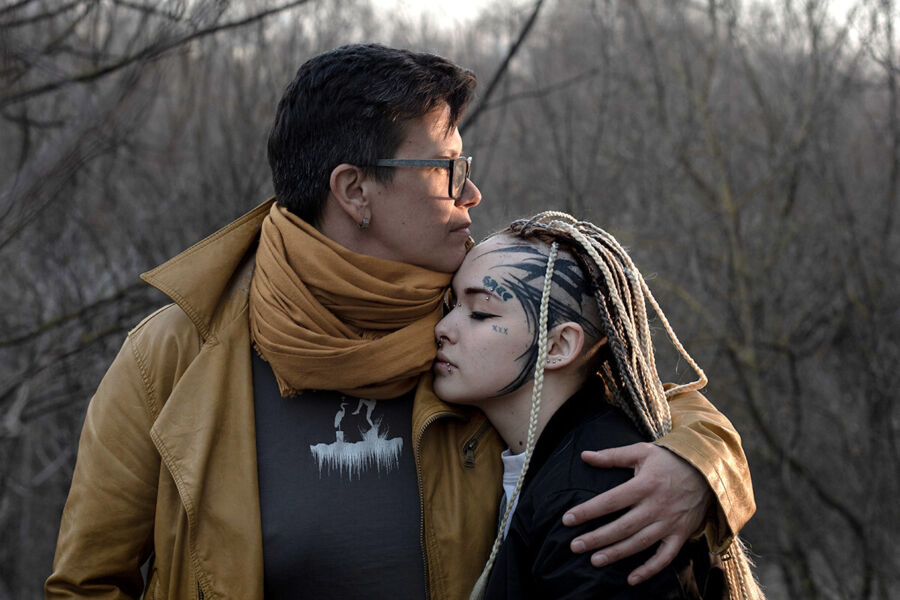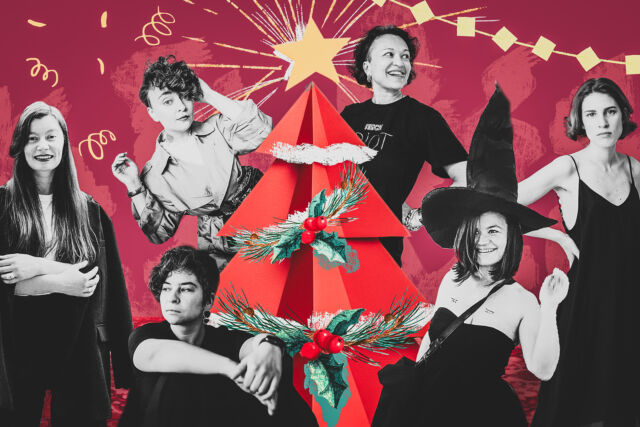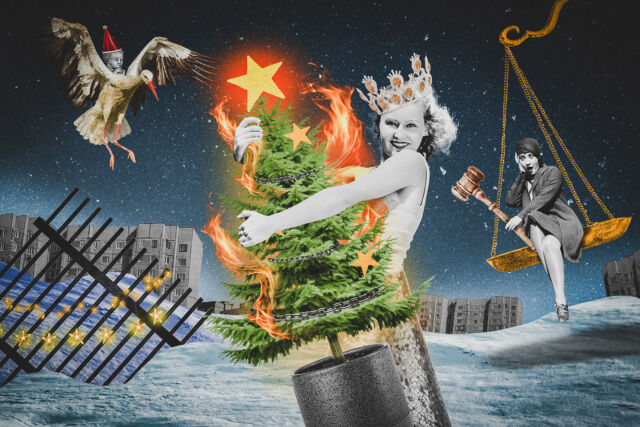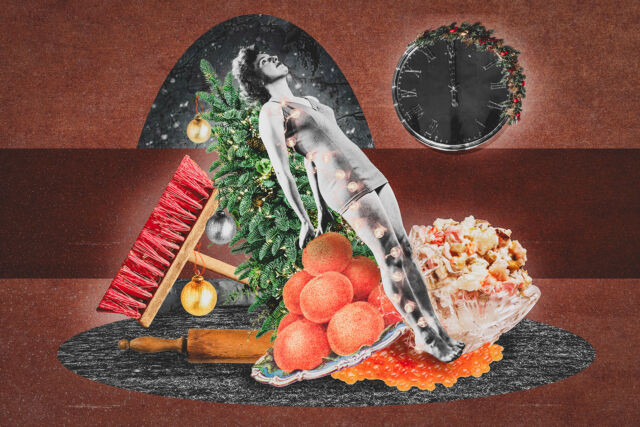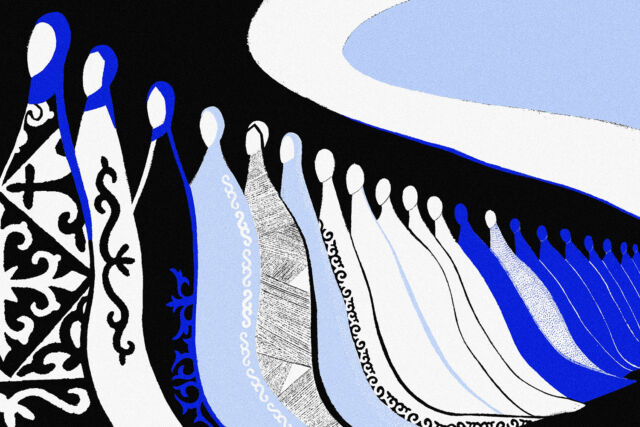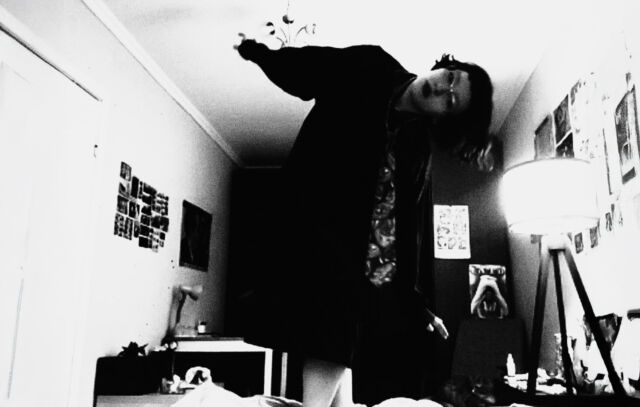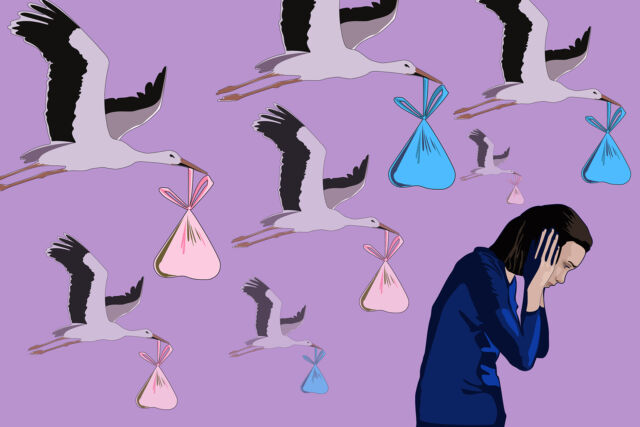Alex is 18, she loves hanging out with her friends, horse riding, camping, and her mom that she has been living with since early childhood. Her mom’s name is Mariko, she is 39, and she is in a polyamorous relationship with her girlfriend. Mariko’s partner has a husband and a child. Alex spends a lot of time with them—they are friends. Alex’s father lives separately but they often meet up and keep in touch.
The interview for Glasnaya was the first time for Alex and Mariko to publicly speak about their life and sexuality. Alex told us about her relationship with her mother, growing up in a “non-traditional” family, and whether that affected her morals and gender identity. And Mariko shared her experience with how society treats her, how she raises her daughter, which values you should teach your child, and what the most important part of her relationship with Alex is.
Alex, 18
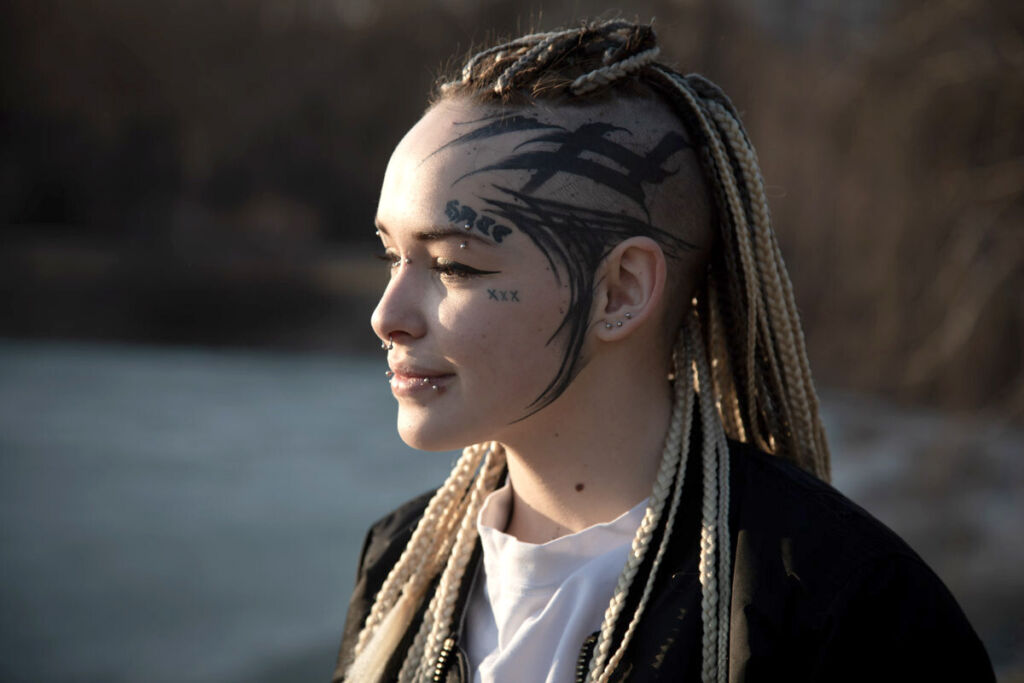
“My dad always was and still is a part of my life”
When I was a kid, until I was around 9, I lived with my mom and her girlfriend. I really liked and respected that girl. I called her by her name and sometimes mom. I never had questions for my mom—we just lived together, it was normal for me. Besides, my dad always was and still is a part of my life. As a child, I used to come and visit him, stay over sometimes, we took walks, and spent time together. He has a new family now, I have a half-brother and a half-sister. We get along really well.
I never asked my mom why she was dating women and why we lived the way we did. I understood everything. That’s why people have brains—to observe and understand things. Plus, there is a thing called the Internet where you can ask any questions. After my mom broke up with that girl, we lived with another mom’s girlfriend for 4 years. I didn’t call her mom, only by her name. I didn’t tell anyone about my family at school. Not because I was ashamed of my mom but because homophobes can be dangerous. They might call child protective services and tell them something… And why would I talk about my private life to strangers? My best friend is the only one who knows. When I told her, she asked me what it felt like to live in such a family. And I replied, “What do you mean “such a family?” It’s the same as yours, I just have two moms.”
A normal family is when you feel comfortable around your loved ones, it’s when you trust them and enjoy spending time with them.
That’s what family is. And it doesn’t matter whether you have a mom and a dad, or two moms, or whatever.
I’ve seen different forms of relationships, I don’t find them abnormal. I have nothing against people seeing each other and sleeping together. Everyone should mind their own business.
“My appearance is a protest against clichés”
My appearance is not very conventional, I don’t look like the majority of teenagers. I might be read as boyish because of the way I dress, behave, and express myself. But that’s what feels right for me, my mom has nothing to do with it. She doesn’t try to influence me in how I behave and look. She is okay with everything. When I did an eyebrow piercing, she only asked, “How is your brow? Does it hurt?” And I hadn’t told her about it before I had it done. The same goes for my tattoos: she doesn’t criticize me but insists that it’s an experienced professional who does it. My mom is raising me to have a free spirit. She is a very good person. She is not ashamed to be herself, I think it’s great, I respect her for that. And I try to look up to her and not depend on other people’s opinions. In some ways, my appearance is a protest against clichés. Shaved sides, for example. I’m constantly told, “You’re a girl, undo your hair!” This phrase pisses me off. I don’t owe anything to anyone. I like it the way it is! Everyone should look the way they want to.
I once almost got in trouble because of my appearance but my boyfriend helped me. And my mom told me she got attacked because of her looks multiple times. Once, a man on the subway beat her up and ripped her piercings out. I’ll never forget that story. How could anyone humiliate and beat someone up just because of their appearance? I don’t understand why people give her so much negative attention. Last year, a cashier at the checkout asked my mom, “Are you old enough to buy it, young man?” That’s how people often call her when they first see her—a young man. I don’t get it. My mom has short hair, it suits her, and she dresses very well. Yes, she doesn’t wear dresses and heels but I, for example, don’t wear those too, that’s normal. I don’t feel comfortable in dresses and heels—I only put them on when I go to the theater a few times a year. But I prefer sneakers and shirts.
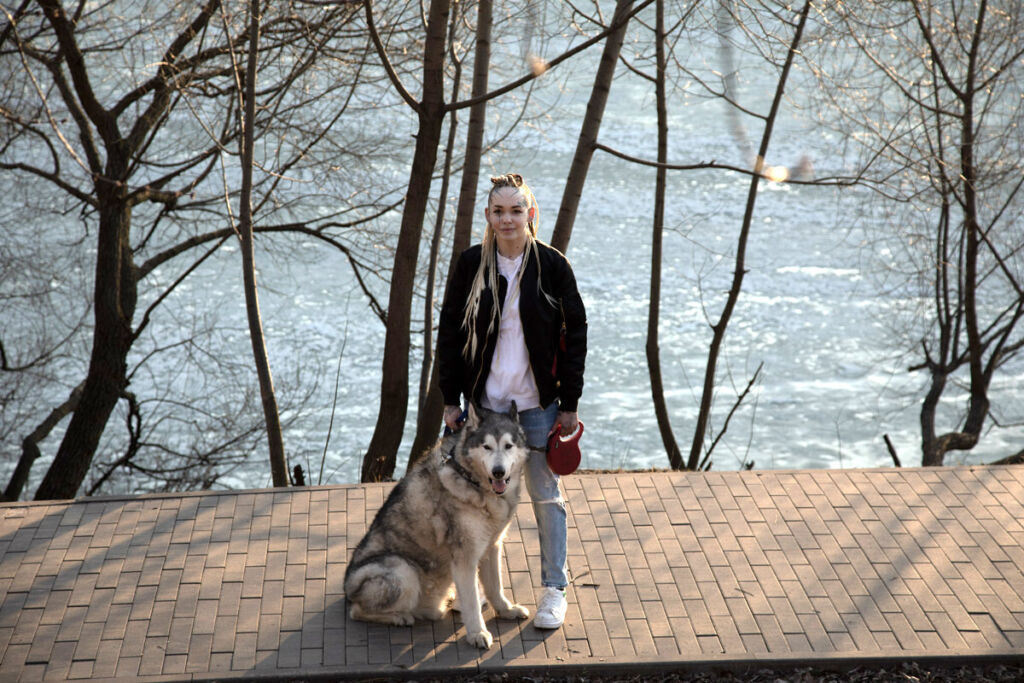
There are a lot of homophobes and people who don’t respect others’ choices in Russia. I think everyone has a right to love who they want to and choose their partner on their own. You should listen to yourself and your feelings and choose the ones you truly love, no matter what society tells you.
By criticizing gay people, homophobes only humiliate themselves. They are very self-conscious and try to hide it by forbidding others to express themselves. One of my friends told me once, “Ew, gays, that’s disgusting, why would they need pride parades?” I replied, “Why do you care? They don’t hurt anyone, don’t promote drug use, they don’t do anything bad.” He just kept going with his “that’s disgusting” line. So I said, “Ok, it’s only up to you to decide what’s normal, but everyone has a right to the freedom of choice.”
“Ok, cool”
I heard an opinion that if a child is raised in a family of LGBT+ people, they will certainly become gay or lesbian when they grow up. That’s nonsense! I’m straight. I like beautiful girls, I like talking to them when we have similar interests. But I’m sexually attracted to boys. And I’m grateful to my mom for not limiting my options. By the way, when I was 12, I came up to my mom and told her, “Mom, I’m bisexual.” I don’t know why I said it that way. I realized that if my classmates said something of that sort to their parents, it wouldn’t end well. I think I was trying to express a protest. I expected mom to start arguing with me. But she only said, “Ok, cool.” That’s pretty much how my “bisexuality” ended.
My mom has a girlfriend and that girlfriend has a husband and a child. They’re in an open relationship, we don’t live together but we’re all friends.
I ask for advice and share things with the husband of mom’s girlfriend. I can call him or my mom’s girlfriend anytime.
My mom told me about this relationship herself. One day, she came up to me and said she wanted me to meet her. I support my mom’s choice because she’s happy. If she doesn’t feel comfortable in a relationship, she will tell me, we are friends. And it’s cool! I also tell my mom about my relationships and ask for advice. She supports and helps me.
I finished nine years of school. I like drawing. I work at a tattoo studio and I’m currently making a portfolio to apply to an art school. My tattoos are based on my sketches. I also do horse riding, I have a junior category. I sometimes work as a trainer at the stable. My favorite animals are horses and foxes.
I’d like to leave Russia. Europeans are much more pleasant to communicate with. In Russia, no matter where we are, we get a lot of aggression, people are mean. I like this country because I have friends here but I think life in Europe would be calmer. Let’s see what happens. One thing I know for sure: whether I decide to leave or stay, my mom would support me.
I’m grateful to my mom for seeing me as a complete person, trusting me, and letting me decide for myself. If she’s against something, we can always find a compromise. She’s really cool! I’m never ashamed of her and can always invite her to spend time with my friends. It means a lot to me. I love my mom.
Mariko, 39
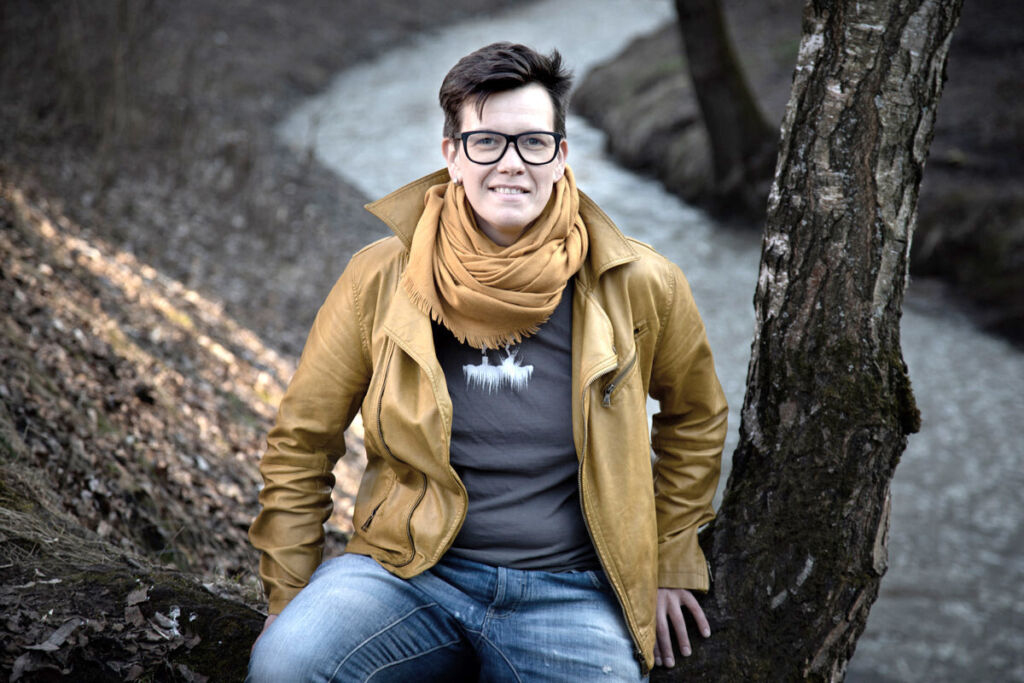
“I am a devoted mother”
I realized I wanted a child by the time I was only 17. I wanted to be close with my kid and give birth to them as soon as possible. Alex was born when I was 21. I had her with my friend, we just had agreed on that. I wanted a kid, he wanted a family. We decided I would do it for myself but if he wanted to participate that wouldn’t be a problem. I believe you shouldn’t give birth if you’re not sure you can raise them on your own. I think it’s silly to bring a child into this world just to save a relationship or make it last longer.
I remember the moment when they showed me a monitor during an ultrasound. I saw that little shrimp on the screen. They told me, “That’s your child.” And that’s when I truly realized that, I decided I would do anything for my future baby. I am a devoted mother: I knew why I needed a child and how to take care of that child from the start. The coolest present I received after Alex was born was a baby carrier backpack—I took her everywhere with me. And I imagined how we would hang out together when she turns 16. I couldn’t have this kind of relationship with my mom, I couldn’t invite her to parties. I didn’t want Alex to feel uncomfortable when I’m around her group of friends. I think I got it.
Alex’s dad didn’t live long with us, I knew I wouldn’t be able to build the relationship I wanted with him. After trying and suffering for a few years, we split. We have a great relationship now, we live close, Alex talks to him, they even go to the sea together. Back then, we weren’t a family because a family is a place where people feel and understand each other on a completely different level.
My mom never said anything about my relationships even though she considered them strange. She didn’t stop me from doing things but there never was support and trust between us. Understanding what I was lacking when I was a kid, I tried to give it to Alex.
“There is nothing wrong with having sex”
I have a favorite phrase: you have to raise your child in a way that when they grow up they can afford a therapist. The most important thing I was and still am teaching her is that being an adult means being responsible. If you do something, you’re responsible for it. From alcohol consumption to your actions towards people. You need to know everything about keeping yourself safe. All the teenage things like alcohol, sex, shady friends. You have to understand that if you drink, you need to choose good alcohol. That the most horrible things can happen when you’re drunk and that you shouldn’t drink with strangers.
We also discuss sex. We first talked about it when Alex was 13. I told her there is nothing wrong with having sex. “You should understand that it’s your responsibility and that there are rules you need to follow. Firstly, no means no. Nobody can violate your boundaries, your body belongs to you only. Secondly, you need to make sure it’s safe.” Alex listened to me and said, “Mom, you’re so weird. Another parent would tell me that it’s bad.” There is no point in avoiding this topic: the more restrictions you put, the more interest a child would have and the more they would protest. To make this discussion more comfortable for both of us, we were watching a TV show where teenagers had sex all the time. She was watching it patiently and then got mad, “Mom, what is that?” But because of that show, we started talking about things she used to be scared to discuss before.
Alex never asked me why we lived the way we did. I started living with a girl when she was two and a half. We were together for seven years. Alex saw we kept in touch with different couples: heterosexual, homosexual, with kids, with no kids.
I never treated people differently, I never told her, “Alex, meet my gay friends, they have two children.” It would be the same as if I said, “Hey, this is Anatoly, he likes anal sex.”
I am not a lesbian, I am who I am. I work on the popularization of science, I love my job, I take children camping, I also do mushing. It’s the things I do and how I do them that characterize me as a person, not my sexual orientation.
Alex didn’t ask about my girlfriend. And there’s nothing weird about it. Would you consider it normal if a child learned how to talk and started asking questions about the dad, “Mom, why is this man living with us?”
Alex went to a school that was quite liberal, nobody tried to find out about my sexual orientation. They didn’t ask too many questions.
“I’m so sick of you faggots!”
I am a teacher and I try to teach children to have a broader perspective. I teach not only my subject but also how to explore this world and work with information. I enjoy working. I know for sure teaching and popularization of science are my calling. However, things didn’t always go well in my teaching career.
We once went camping with my students. One boy, a sixth-grader, saw two boys, ninth-graders, holding hands on their walk and told them, “Burn in hell, stupid gays.” A boy from the ninth grade started discussing it with the sixth-grader. He gave him an example, “What if a gay person saves your mom from death? Would they still be a bad person?” And he replied, “Gays won’t even come close to my mom!” I was observing their debates for three days and didn’t get involved. Because if I did, I would literally admit that the boy’s parents weren’t right, and that could hurt him. Finally, when they ended up fighting, I couldn’t stand it any longer and said, “Guys, I think you should always remain human under any circumstances. The most important qualities in a person are kindness, compassion, and respect.” When we got back, the sixth-grader said something to his mom and never went camping with us after. His mom, however, came to school.
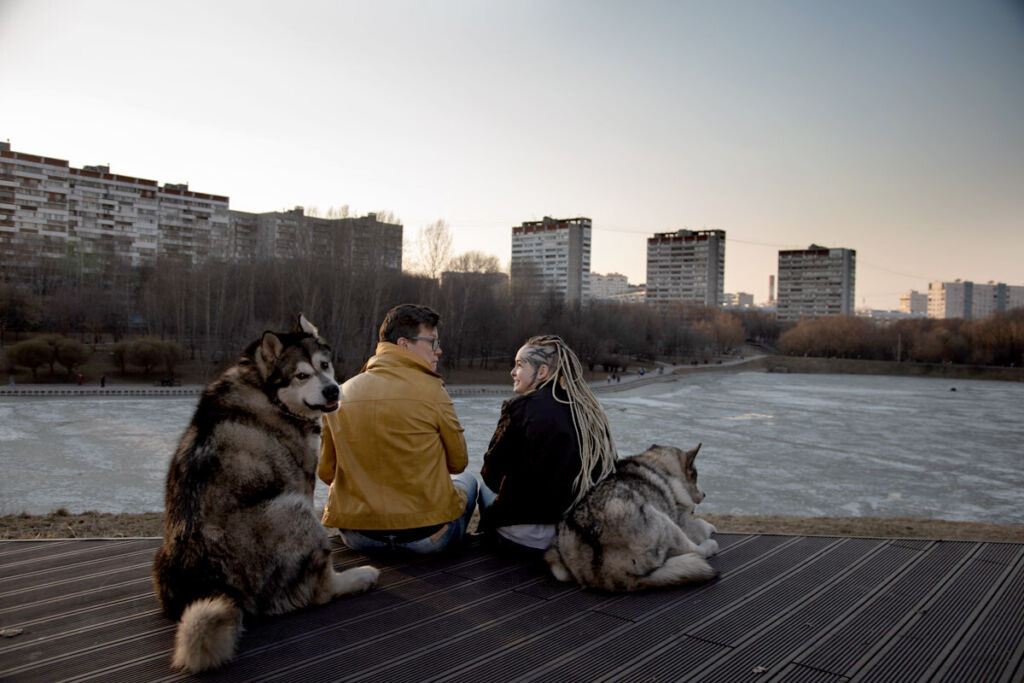
That hike was in autumn. And in winter, the principal called me and started talking about Moscow School 57. She asked me if I knew about it. I didn’t know what she was talking about and she added, “There is an eleventh grader that goes camping with you, it’s better she doesn’t from now on.” And I really couldn’t get it. It turned out she thought I was giving my students more attention than it was acceptable. And then that eleventh grader came up to me, I learned she also was called by the principal and was told not to speak to me. She was crying, asking what happened and why she couldn’t go hiking with me anymore… In the end, I got fired, allegedly for not having a teacher education. Plus, the entire sixth grade got Ds for their test. But there is no way the entire class got such bad grades at the same time. All in all, it’s hard for me to tell this story. I feel very sorry and would love to get back to school. Children still write to me, wishing me happy birthday and happy teachers’ day. And they continue camping with me too.
I often encountered aggression in my childhood and youth. When I was studying at the university, I took the red metro line. There were a lot of football fans at the Sportivnaya station. They often asked, “Hey man, are you getting off?”
When I told them I wasn’t a guy, they would reply, “You, faggot!” and punch me in the face. It kept happening for about ten years of my life.
Back then, in the early 1990s, people didn’t understand women could have different body types. Even now, anything could happen, it’s not completely safe.
They once beat me up very hard, I told Alex about that case: she touched my ear, that was very painful. And I told her why it hurt.
I was in the metro waiting for my friend, we were supposed to go somewhere together. A man that was passing by hit me with a bag full of bottles under the knee. I was in a good mood so I turned to him and kindly told him, “Young man, could you please be more careful?” He replied, “I’m so sick of you faggots!” and hit me on the head with that bag. I fell, he lifted me with the shoelaces that I wore tied around my neck. He ripped my earring and other accessories off, cut my skin on the back of my neck with the shoelaces, and hit me on the head so it bled. It was so unexpected I didn’t react at first but then my survival instinct kicked in. I stood up and started defending myself—it felt like I had to protect my life. The policemen pulled him off me. I had a yellow Columbia hiking jacket on that day. It was my mom’s present for my birthday, I really wanted that jacket, it looked bright and was expensive. That day was the first time I put it on. And it got all covered in blood, I couldn’t get rid of the stains. It’s still somewhere in our summer house, every time I see it I remember that incident.

And once I urgently needed to change a pad. I went to McDonald’s with a pad in my hand. A security guard ran to me and threw me against the wall. He said, “Where do you think you’re going?” I replied, “I need to change a pad.” He said, “Are you f***ing kidding me?!” I was already feeling vulnerable, I nearly had blood all over my pants, and now that happened. I was confused. Then a woman with a child came out and made the guard let me go. I went to the bathroom and spent 15 minutes crying there. I still don’t understand what he wanted from me. Unfortunately, such cases happen sometimes. There was an unpleasant situation when I was eight months pregnant—some random woman punched me in the stomach. I didn’t even see her coming, she did it for no reason. Also, once a man started pushing me in front of Alex, she was still little, she ran to help me… Nowadays, physical aggression is less common but I can still feel others staring at me. When people look at me I try to smile—that way they get more relaxed.
“I hope there will be at least some freedom”
When I watched school children dancing in BDSM costumes at their prom, I thought how great it was that they felt free enough to do that! Maybe that’s how we’ll end all the horrible things that are happening right now. And maybe something will change when Alex is older. I hope there will be at least some freedom because today, it simply isn’t there.
I followed her on Instagram but I feel awkward so I don’t check it. If she has problems she will tell me, and if she needs to share something with me, she will. But we know each others’ social media passwords just in case. It doesn’t mean I log in to her accounts and violate her boundaries. She has her own life, she’s an adult now. I was so worried when grown-up men started texting her. But I knew I had to mind my own business. I only asked her to be careful.
“If you feel like something is off, then it probably is. And you can always tell me anything.”
I will support all her life choices if they make her happy. If Alex wants to become a cashier at McDonald’s and it makes her happy, I will be glad for her. It’s better than if she, for example, lived in Denmark, worked for some cool company, and felt uncomfortable.
I’m raising Alex to be a person with freedom of self-expression. My daughter’s sexuality is nobody’s business but hers. I remember Alex told me she was probably bi. I replied, “Ok, cool.” If I told her, “Alex, are you out of your mind?!” she would start protesting. But I gave her freedom. It’s only up to you what partner to choose. If it’s within the law and you feel happy, go for it. I want my daughter to share her struggles with me and trust me. I want her to be happy.
Editor’s note: While we were working on this article, Alex got married.

The Different series is a project by Glasnaya and Novaya Gazeta about people who do not meet the standards of today’s Russian society, which leads to them becoming invisible to the majority. In Russia, it is customary not to notice, to ignore “others”, those who are different—and ignorance becomes the breeding ground for xenophobia and discrimination.
Those who are different are often afraid to put themselves out there. But there are more and more people who have already overcome their fears. Those are women and men breaking stereotypes and the framework of patriarchy.
The material is published jointly with Novaya Gazeta.

